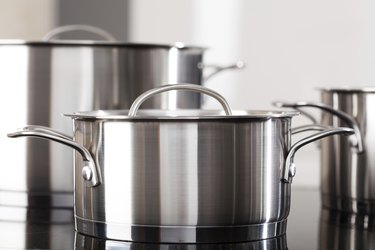
Cooking with aluminum pans, using aluminum foil and drinking out of aluminum bottles has many people worried. You may have heard rumors of aluminum being linked with health issues, including Alzheimer's disease. But what does the actual evidence say — should we worry about aluminum or not?
Cooking with Aluminum
Video of the Day
According to the Agency for Toxic Substances and Disease Registry (ATSDR), aluminum is the most abundant metal in the earth's crust, so being exposed to it is inevitable. It naturally finds its way into water, soil and food, so you'll certainly ingest some of the metal every day.
Video of the Day
However, the consensus from scientific experts is that the amount of aluminum likely to make it into your body from food, drink and by using aluminum pots and pans is very small and not harmful.
In fact the ATSDR states that people only absorb 0.01 to 5 percent of the aluminum they ingest. So when you do consume aluminum, the vast majority of it won't pass into your bloodstream from the digestive tract.
Most people are only likely to have a worrisome build up of aluminum through occupational exposure — which most likely happens by breathing in large amounts of aluminum dust without a protective mask.
Aluminum and Alzheimer’s Disease
According to both the Alzheimer's Association and the Alzheimer's Society Canada, there's no convincing evidence that normal day-to-day exposure to aluminum, including cooking with aluminum, is connected to the development of dementia.
The latter organization says early studies focused on some animals that were particularly susceptible to aluminum poisoning, leading to incorrect conclusions about the general effects of aluminum on the human body.
That said, a September 2017 review in the German medical journal Deutsches Ärzteblatt International found that people who had twice the biologically acceptable level of aluminum in their blood experienced a reduced performance in attention, learning and memory tests. But these sorts of levels were only found in workers in the aluminum industry and even then there was no obvious link with Alzheimer's.
It's worth noting, however, that people who have kidney disease may be more vulnerable to aluminum toxicity. The ATSDR says that if you have poorly functioning kidneys you don't clear aluminum as well from the body, so more ends up accumulating in your system.
How to Minimize Aluminum Intake
Even though aluminum isn't likely to be a problem for most healthy people, it still makes sense to minimize your intake wherever you can, especially if you have reduced kidney function.
This doesn't mean you need to throw away your aluminum pots and pans, but it does mean not cooking with aluminum if the dish you are making is acidic. Research in an April 2017 issue of Environmental Sciences Europe found that aluminum intakes were above acceptable levels when a fish dish marinated in lemon juice was cooked in aluminum. Similarly, when canned ravioli in acidic tomato sauce was cooked in aluminum, high levels of the metal leached into the food.
Another aluminum-avoidance strategy — also good for health generally — is reducing your intake of processed food, which may expose a person to higher levels of aluminum intake. Food additives, including the stabilizers sodium aluminum phosphate and sodium aluminum sulfate, are present in many foods including baked goods made with self-rising flours according to the U.S. Food and Drug Administration.
It could also pay not to drink endless cups of tea a day. A study in the September 2013 edition of the Journal of Toxicology found aluminum levels were above recommended guidelines in 20 percent of the brewed teas examined.
- ATSDR: "Toxic Substances Portal — Aluminum"
- ATSDR: "ToxGuideTM for Aluminum"
- Alzheimer's Association: "Myths"
- Alzheimer Society Canada: "Aluminum and Dementia: Is There a Link?"
- Deutsches Ärzteblatt International: "The Health Effects of Aluminum Exposure"
- Environmental Sciences Europe: "Migration of Aluminum From Food Contact Materials to Food — a Health Risk for Consumers? Part iii of iii: Migration of Aluminum to Food From Camping Dishes and Utensils Made of Aluminum"
- U.S. Food and Drug Administration: "Food Additive Status List"
- Journal of Toxicology: "The Benefits and Risks of Consuming Brewed Tea: Beware of Toxic Element Contamination"
Is this an emergency? If you are experiencing serious medical symptoms, please see the National Library of Medicine’s list of signs you need emergency medical attention or call 911.